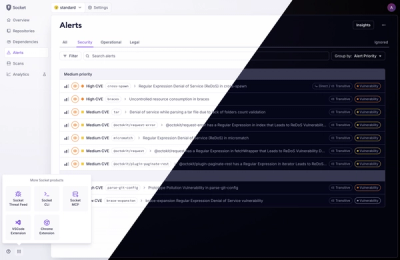
Product
A Fresh Look for the Socket Dashboard
We’ve redesigned the Socket dashboard with simpler navigation, less visual clutter, and a cleaner UI that highlights what really matters.
next-rest-framework
Advanced tools
Next REST Framework - write type-safe, self-documenting REST APIs in Next.js
Type-safe, self-documenting REST APIs for Next.js
Next REST Framework is an open-source, opinionated, lightweight, easy-to-use set of tools to build type-safe, self-documenting HTTP REST APIs with Next.js. Building OpenAPI specification-compliant REST APIs can be cumbersome and slow but Next REST Framework makes this easy with auto-generated OpenAPI documents and docs using TypeScript and object schemas.
This is a monorepo containing the following packages / projects:
next-rest-framework packageopenapi.json spec file from your business logic.npm install --save next-rest-framework
To get access to the auto-generated documentation, initialize the docs endpoint somewhere in your codebase. You can also skip this step if you don't want to expose a public API documentation.
// src/app/api/route.ts
import { docsRouteHandler } from 'next-rest-framework';
export const GET = docsRouteHandler();
// src/pages/api.ts
import { docsApiRouteHandler } from 'next-rest-framework';
export default docsApiRouteHandler();
This is enough to get you started. Now you can access the API documentation in your browser. Calling this endpoint will automatically generate the openapi.json OpenAPI specification file, located in the public folder by default. You can also configure this endpoint to disable the automatic generation of the OpenAPI spec file or use the CLI command npx next-rest-framework generate to generate it. You can also create multiple docs endpoints for various use cases. See the full configuration options of this endpoint in the Docs handler options section.
// src/app/api/todos/route.ts
import { routeHandler, routeOperation } from 'next-rest-framework';
import { NextResponse } from 'next/server';
import { z } from 'zod';
const TODOS = [
{
id: 1,
name: 'TODO 1',
completed: false
}
];
// Example App Router route handler with GET/POST handlers.
const handler = routeHandler({
GET: routeOperation({
operationId: 'getTodos',
tags: ['example-api', 'todos', 'app-router']
})
.output([
{
status: 200,
contentType: 'application/json',
schema: z.array(
z.object({
id: z.number(),
name: z.string(),
completed: z.boolean()
})
)
}
])
.handler(() => {
return NextResponse.json(TODOS, {
status: 200
});
}),
POST: routeOperation({
operationId: 'createTodo',
tags: ['example-api', 'todos', 'app-router']
})
.input({
contentType: 'application/json',
body: z.object({
name: z.string()
})
})
.output([
{
status: 201,
contentType: 'application/json',
schema: z.string()
}
])
.handler(async (req) => {
const { name } = await req.json();
console.log('Strongly typed TODO name: ', name);
return NextResponse.json('New TODO created.', {
status: 201
});
})
});
export { handler as GET, handler as POST };
// src/pages/api/todos.ts
import { apiRouteHandler, apiRouteOperation } from 'next-rest-framework';
import { z } from 'zod';
const TODOS = [
{
id: 1,
name: 'TODO 1',
completed: false
}
];
// Example Pages Router API route with GET/POST handlers.
export default apiRouteHandler({
GET: apiRouteOperation({
operationId: 'getTodos',
tags: ['example-api', 'todos', 'pages-router']
})
.output([
{
status: 200,
contentType: 'application/json',
schema: z.array(
z.object({
id: z.number(),
name: z.string(),
completed: z.boolean()
})
)
}
])
.handler((req, res) => {
res.status(200).json(TODOS);
}),
POST: apiRouteOperation({
operationId: 'createTodo',
tags: ['example-api', 'todos', 'pages-router']
})
.input({
contentType: 'application/json',
body: z.object({
name: z.string()
})
})
.output([
{
status: 201,
contentType: 'application/json',
schema: z.string()
}
])
.handler((req, res) => {
const { name } = req.body;
console.log('Strongly typed TODO name: ', name);
res.status(201).json('New TODO created.');
})
});
These type-safe endpoints will be now auto-generated to your OpenAPI spec:

The following options can be passed to the docsRouteHandler (App Router) and docsApiRouteHandler (Pages Router) functions for customizing Next REST Framework:
| Name | Description |
|---|---|
deniedPaths | Array of paths that are denied by Next REST Framework and not included in the OpenAPI spec. Supports wildcards using asterisk * and double asterisk ** for recursive matching. Example: ['/api/disallowed-path', '/api/disallowed-path-2/*', '/api/disallowed-path-3/**'] Defaults to no paths being disallowed. |
allowedPaths | Array of paths that are allowed by Next REST Framework and included in the OpenAPI spec. Supports wildcards using asterisk * and double asterisk ** for recursive matching. Example: ['/api/allowed-path', '/api/allowed-path-2/*', '/api/allowed-path-3/**'] Defaults to all paths being allowed. |
openApiObject | An OpenAPI Object that can be used to override and extend the auto-generated specification. |
openApiJsonPath | Path that will be used for fetching the OpenAPI spec - defaults to /openapi.json. This path also determines the path where this file will be generated inside the public folder. |
autoGenerateOpenApiSpec | Setting this to false will not automatically update the generated OpenAPI spec when calling the docs handler endpoints. Defaults to true. |
docsConfig | A Docs config object for customizing the generated docs. |
suppressInfo | Setting this to true will suppress all informational logs from Next REST Framework. Defaults to false. |
The docs config options can be used to customize the generated docs:
| Name | Description |
|---|---|
provider | Determines whether to render the docs using Redoc (redoc) or SwaggerUI swagger-ui. Defaults to redoc. |
title | Custom title, used for the visible title and HTML title. |
description | Custom description, used for the visible description and HTML meta description. |
faviconUrl | Custom HTML meta favicon URL. |
logoUrl | A URL for a custom logo. |
The following options cam be passed to the routeHandler (App Router) and apiRouteHandler (Pages Router) functions to create new API endpoints:
| Name | Description | Required |
|---|---|---|
GET | PUT | POST | DELETE | OPTIONS | HEAD | PATCH | A Method handler object. | true |
openApiPath | An OpenAPI Path Item Object that can be used to override and extend the auto-generated specification. | false |
The route operation functions routeOperation (App Router) and apiRouteOperation (Pages Router) allow you to define your API handlers for your endpoints. These functions accept an OpenAPI Operation object as a parameter, that can be used to override the auto-generated specification. Calling this function allows you to chain your API handler logic with the following functions.
| Name | Description |
|---|---|
input | An Input function for defining the validation and documentation of the request. |
output | An Output function for defining the validation and documentation of the response. |
handler | A Handler function for defining your business logic. |
middleware | A Middleware function that gets executed before the request input is validated. |
The input function is used for type-checking, validation and documentation of the request, taking in an object with the following properties:
| Name | Description | Required |
|---|---|---|
contentType | The content type header of the request. When the content type is defined, a request with an incorrect content type header will get an error response. | false |
body | A Zod schema describing the format of the request body. When the body schema is defined, a quest with an invalid request body will get an error response. | false |
query | A Zod schema describing the format of the query parameters. When the query schema is defined, a request with invalid query parameters will get an error response. | false |
Calling the input function allows you to chain your API handler logic with the Output, Middleware and Handler functions.
The output function is used for type-checking and documentation of the response, taking in an array of objects with the following properties:
| Name | Description | Required |
|---|---|---|
status | A status code that your API can return. | true |
contentType | The content type header of the response. | true |
schema | A Zod schema describing the format of the response data. | true |
Calling the input function allows you to chain your API handler logic with the Middleware and Handler functions.
The middleware function is executed before validating the request input. The function takes in the same parameters as the Next.js Route Handlers and API Routes handlers.
The handler function is a strongly-typed function to implement the business logic for your API. The function takes in strongly-typed versions of the same parameters as the Next.js Route Handlers and API Routes handlers.
The Next REST Framework CLI supports generating and validating the openapi.json file:
npx next-rest-framework generate to generate the openapi.json file.npx next-rest-framework validate to validate that the openapi.json file is up-to-date.The next-rest-framework validate command is useful to have as part of the static checks in your CI/CD pipeline. Both commands support the following options:
| Name | Description |
|---|---|
--skipBuild <boolean> | By default, next build is used to build your routes. If you have already created the build, you can skip this step by setting this to true. |
--distDir <string> | Path to your production build directory. Defaults to .next. |
--timeout <string> | The timeout for generating the OpenAPI spec. Defaults to 60 seconds. |
--configPath <string> | In case you have multiple docs handlers with different configurations, you can specify which configuration you want to use by providing the path to the API. Example: /api/my-configuration. |
See the changelog in CHANGELOG.md
All contributions are welcome!
ISC, see full license in LICENSE.
3.2.0 - 2023-10-23
FAQs
Next REST Framework - Type-safe, self-documenting APIs for Next.js
The npm package next-rest-framework receives a total of 1,203 weekly downloads. As such, next-rest-framework popularity was classified as popular.
We found that next-rest-framework demonstrated a healthy version release cadence and project activity because the last version was released less than a year ago. It has 1 open source maintainer collaborating on the project.
Did you know?

Socket for GitHub automatically highlights issues in each pull request and monitors the health of all your open source dependencies. Discover the contents of your packages and block harmful activity before you install or update your dependencies.

Product
We’ve redesigned the Socket dashboard with simpler navigation, less visual clutter, and a cleaner UI that highlights what really matters.

Industry Insights
Terry O’Daniel, Head of Security at Amplitude, shares insights on building high-impact security teams, aligning with engineering, and why AI gives defenders a fighting chance.

Security News
MCP spec updated with structured tool output, stronger OAuth 2.1 security, resource indicators, and protocol cleanups for safer, more reliable AI workflows.